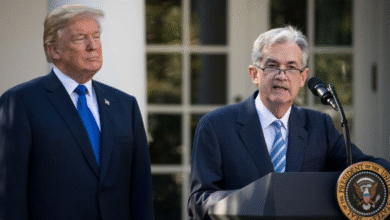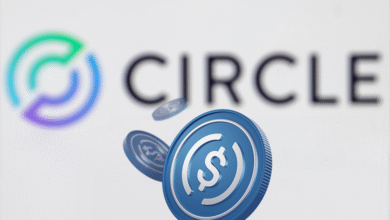Crypto Legislation: US Lawmakers Set September Deadline

The rapid evolution of crypto legislation is capturing the attention of U.S. lawmakers who are racing to finalize foundational regulations by September. This move aims to propel the United States into a leading role in global cryptocurrency regulations and digital asset innovation, cementing its status as the crypto capital of the world. With the introduction of the GENIUS Act, lawmakers such as Tim Scott and Cynthia Lummis are prioritizing clear guidelines that foster a thriving ecosystem for digital currencies. Their commitment underscores the importance of regulatory clarity in securing economic supremacy in this burgeoning market. As America seeks to set the standard for cryptocurrency, the upcoming legislation could dramatically reshape the landscape for investors and innovators alike.
As the landscape of digital currencies continues to evolve, U.S. legislators are pushing to establish a robust framework governing cryptocurrencies. This pivotal legislative effort is set against the backdrop of the U.S. aspirations to become the leading force in the realm of digital assets. Prominent figures in government are collaborating to introduce necessary reforms, ensuring that market participants have the clarity and certainty they need to thrive. The urgency surrounding the passage of new rules, including the notable GENIUS Initiative, reflects an understanding of the critical role that regulatory structures play in fostering innovation. By positioning itself as the home of digital asset regulatory clarity, America aims to outperform international competitors and drive forward the future of fintech.
US Lawmakers Rally for Comprehensive Crypto Legislation
In a decisive move to establish the United States as a frontrunner in the crypto space, lawmakers are uniting to finalize comprehensive cryptocurrency regulations. As discussions intensify, Senate Banking Committee Chairman Tim Scott and his colleagues are advocating for clarity and predictability within the digital asset market. They believe that by creating a robust regulatory framework, the U.S. can attract more investment and drive innovation in the cryptocurrency sector. This legislative push is not merely about regulation but about positioning the U.S. as the ‘crypto capital of the world.’ By fostering an environment conducive to crypto growth, U.S. lawmakers can create a flourishing ecosystem for digital assets.
Lawmakers are emphasizing the urgency of drafting and implementing these regulations, given the increasing global competition in digital assets. They recognize that countries like China and Europe are making significant strides in regulatory measures and are poised to seize the opportunity to lead in cryptocurrency innovation. American lawmakers aim to counteract this by setting a precedent for transparency and guiding principles that will streamline the market for businesses and investors alike. The aim is not only to protect consumers but to propel the U.S. forward as the hub for digital asset innovation.
The Senate’s commitment to expedited legislative action underscores the seriousness of this initiative. With a firm deadline set for September 30, 2023, there is a focused determination to ensure that the U.S. does not fall behind in the digital asset race. This aligns with the recent passing of the GENIUS Act, which showcases the country’s proactive stance towards establishing regulations around payment stablecoins. As discussions continue, Congress aims to encompass a broader spectrum of cryptocurrency aspects, providing a foundational framework that could transform how digital assets are utilized across various sectors of the economy. The collaborative effort from lawmakers from both parties signifies a rare moment of unity, underscoring the belief that a cooperative approach is necessary to navigate the complexities of cryptocurrency regulations.
The GENIUS Act and its Implications for the Crypto Market
The GENIUS Act represents a pivotal step in the legislative journey aimed at creating a more structured framework for cryptocurrency, particularly around payment stablecoins. With lawmakers like Tim Scott prioritizing swift action, this act seeks to provide clarity and guidance that the market desperately needs. By establishing operational guidelines for digital assets, the GENIUS Act could help mitigate legal uncertainties that have historically plagued the cryptocurrency landscape. This important legislation is designed not just to protect consumers but also to empower innovators within the financial technology sector, allowing for the seamless growth of new and emerging digital currencies.
As the GENIUS Act progresses, it is expected to foster an environment where both established companies and startups can thrive. Enhanced regulatory clarity will make it easier for financial institutions to adopt blockchain technology and integrate digital assets into their operations. Moreover, the act could catalyze innovation by encouraging research and development in the fintech space, positioning the U.S. at the forefront of digital asset solutions globally. By implementing these regulations, U.S. lawmakers hope to establish an ecosystem that attracts investment and talent, reinforcing America’s standing as a leader in digital asset innovation.
However, as lawmakers work to finalize the GENIUS Act, it is crucial that they engage with various stakeholders—industry experts, legal scholars, and academic institutions—to craft regulations that are comprehensive yet flexible. This engagement is vital in ensuring that the legislation is balanced and accommodating to the dynamic nature of the cryptocurrency market. By incorporating diverse viewpoints, the act can address potential pitfalls and embrace the diverse uses of digital assets, from facilitating transactions to enhancing financial inclusion across the country. In essence, the success of the GENIUS Act will depend on its ability to create a regulatory environment that encourages both compliance and innovation.
The Importance of Regulatory Clarity in the Crypto Space
Regulatory clarity is seen as a cornerstone for the future of cryptocurrency adoption within the United States. As emphasized by Senator Scott, creating a predictable regulatory environment can catalyze innovation while ensuring that consumers are protected. The inability to act on establishing clear market structures has been a source of frustration for many stakeholders in the crypto ecosystem. Without clear regulations, companies often hesitate to enter the space, stifling potential growth and hindering the U.S.’s ability to compete with international counterparts. A well-defined regulatory framework can enhance investor confidence, enabling the cryptocurrency market to thrive and evolve alongside traditional finance.
In addition, regulatory certainty is paramount for driving investments in digital assets. Investors are more likely to commit funds to projects that operate under a clear and consistent set of rules. By alleviating fears related to regulatory repercussions, U.S. lawmakers can encourage more capital to flow into the cryptocurrency market, empowering startups and established players alike. The move towards creating these regulatory structures is essential not only for ensuring compliance but also for fostering an environment where innovation can flourish. Such measures will empower the United States to solidify its status as the global leader in cryptocurrency innovation.
However, it remains to be seen how effectively lawmakers can implement these changes. The balance between fostering innovation and ensuring consumer protection will require ongoing work and collaboration among all stakeholders. It is crucial for U.S. lawmakers to remain vigilant and adaptable as they shape the regulatory landscape for cryptocurrencies, keeping up with rapid technological changes in the digital asset space. Ultimately, the commitment to creating clear regulations will play a significant role in establishing the future direction of cryptocurrency in the U.S., which aims to be recognized as the global hub for digital finance.
Engaging Stakeholders for Optimal Digital Asset Legislation
As U.S. lawmakers embark on the mission to craft comprehensive cryptocurrency legislation, stakeholder engagement becomes a necessary component of the process. Lawmakers recognize that input from various sectors—including industry leaders, legal experts, and academic researchers—will prove invaluable in shaping well-rounded digital asset regulations. By proactively seeking feedback and collaboration from these stakeholders, Congress can better understand the complexities of the crypto landscape and address any concerns that might arise during the drafting process. Engaging stakeholders not only enhances the democratic process but also ensures that the resulting legislation aligns with the needs and realities of the evolving market.
Moreover, this collaborative approach is likely to yield a more effective regulatory framework that balances innovation with necessary safeguards. By inviting contributions from stakeholders who understand the intricacies of cryptocurrency operations, lawmakers can ensure that proposed regulations do not stifle growth or innovation. Instead, they can create an environment that empowers entrepreneurs and investors to explore new opportunities within the digital asset space. As the dialogue continues, it is necessary to maintain open lines of communication and adapt to the rapidly changing landscape, which is characterized by swift technological advancements and constantly evolving market demands.
Ultimately, the inclusivity of the legislative process will directly impact the U.S. position in the global cryptocurrency arena. By harnessing the collective knowledge of a diverse range of experts, lawmakers can establish regulations that bolster the U.S. standing as the cryptocurrency capital of the world. This desired outcome hinges on the ability to create a regulatory landscape that encourages innovation while providing a safety net for consumers and investors alike.
The Global Race for Leadership in Cryptocurrency
The race for global leadership in cryptocurrency innovation is intensifying, with countries around the world vying for the top position in the digital assets arena. U.S. lawmakers are keenly aware of the need to act swiftly to secure America’s status as the leading hub for cryptocurrency. In light of accelerated regulatory initiatives in other countries, particularly in Europe and Asia, the U.S. must ensure its policy efforts reflect a commitment to not only fostering local innovation but also attracting international investments. The legislative landscape for cryptocurrency will likely shape how the U.S. competes on a global scale and sets an influential precedent for other nations.
Moreover, the competitive landscape makes it apparent that the stakes are high. Countries that establish favorable regulatory conditions for cryptocurrency often see an influx of talent, innovation, and capital investment. The U.S. must remain proactive in formulating regulations that encourage the growth and adoption of digital assets. By providing the necessary clarity through robust legislation, the U.S. can create an ecosystem that welcomes innovation while meeting international standards. U.S. lawmakers are focused on making America the destination for any entrepreneur looking to navigate the digital asset landscape, further solidifying its position as the global crypto capital.
To achieve this, a continued emphasis on bipartisan efforts is crucial, as collaborative initiatives will enable the U.S. to present a united front in the global market. Lawmakers must come together to create policies that not only respond to current market needs but also anticipate future trends and technological advancements. The ambition to maintain a leadership role in cryptocurrency innovation necessitates an agile and forward-thinking approach to legislation, one that embraces change and encourages investment in a rapidly evolving digital economy.
Future Trends in Cryptocurrency Regulation
As U.S. lawmakers push forward with their legislative agenda for cryptocurrencies, the trends emerging from this initiative will likely shape the future of digital asset regulation. The ongoing discussions around the GENIUS Act and related frameworks are expected to set the stage for more robust and comprehensive legislation. One significant trend is the growing emphasis on regulatory harmonization, whereby U.S. regulations align more closely with international standards. This could facilitate cross-border transactions and create a more favorable environment for global cryptocurrency exchange, beneficial for businesses and investors alike.
Another critical trend to watch will be the potential integration of advanced technologies within the regulatory framework itself. As blockchain technology evolves, lawmakers may adopt innovative tools such as smart contracts and automated compliance mechanisms to streamline the administration of cryptocurrency regulations. Such technological advancements could enhance efficiency and ensure that regulatory standards evolve alongside the industry. As digital assets continue gaining traction, policymakers must remain adaptable, leveraging technology to ensure that their initiatives reflect the needs and realities of a rapidly changing marketplace.
Preparing for a New Era of Digital Assets in the U.S.
With the anticipation surrounding the impending legislation, the United States is on the cusp of a new era for digital assets. As lawmakers emphasize their commitment to regulatory clarity and frameworks, this period represents a critical juncture for how digital assets will be perceived and utilized across various sectors of the economy. The outcome of the legislative discussions will determine how cryptocurrencies can be integrated into the financial landscape, allowing for innovation and growth while also prioritizing consumer protection and risk management.
This new era will also likely give rise to new financial products and services centered around cryptocurrencies and blockchain technology. As regulations become clearer, financial institutions may develop offerings that leverage digital assets, leading to a more inclusive financial landscape. The potential for increased access to investment opportunities and financial services may empower individuals and businesses that have traditionally been marginalized within the financial system. Therefore, the anticipation of clear cryptocurrency regulations is not merely an administrative task; it signifies the dawn of a transformative period in the U.S. financial narrative.
Frequently Asked Questions
What is the significance of the pending crypto legislation by US lawmakers?
The pending crypto legislation, which is set to be finalized by September, is crucial for establishing a comprehensive regulatory framework for cryptocurrency in the U.S. It aims to bolster America’s position as the global capital for digital asset innovation and ensure regulatory clarity, which is vital for the market’s stability.
How will the GENIUS Act influence cryptocurrency regulations in the U.S.?
The GENIUS Act seeks to introduce essential cryptocurrency regulations focusing on payment stablecoins. Its passage is viewed as a major step towards creating a structured environment for digital assets, fostering innovation while ensuring consumer protection and market integrity.
Why do US lawmakers emphasize the need for regulatory clarity in cryptocurrency legislation?
US lawmakers emphasize regulatory clarity in cryptocurrency legislation because it provides certainty and predictability essential for fostering innovation. Clear regulations help businesses thrive in the digital asset space, positioning the U.S. as the leading hub for cryptocurrency innovations.
What are the legislative priorities set by US lawmakers for the cryptocurrency market?
US lawmakers are prioritizing legislation that enhances digital asset regulations, aiming to secure the U.S. as the global leader in cryptocurrency innovation. These priorities include establishing a regulatory framework, ensuring market structure, and galvanizing bipartisan support for rapid progress.
How do US lawmakers plan to make the U.S. the ‘cryptocurrency capital of the world’?
US lawmakers plan to make the U.S. the ‘cryptocurrency capital of the world’ by swiftly finalizing crypto legislation that ensures a favorable regulatory environment for digital assets. This includes the introduction of the GENIUS Act and ensuring engagement from various stakeholders to create effective frameworks.
What role do stakeholders play in the development of crypto legislation?
Stakeholders, including industry professionals, legal experts, and academics, play a vital role in shaping crypto legislation. Their input is essential in drafting comprehensive laws that address the complexities of cryptocurrency regulations, aiding lawmakers in creating effective and informed policy.
What is the deadline set by US lawmakers for finalizing crypto legislation?
The deadline set by US lawmakers for finalizing crypto legislation is September 30. This timeline reflects the urgency to establish a regulatory framework that supports digital asset innovation and maintains the U.S.’s leadership role in the global cryptocurrency market.
How does the current legislative approach impact digital asset innovation?
The current legislative approach aims to define clear rules for digital asset innovation, fostering a safe environment for investment and growth. By establishing comprehensive cryptocurrency regulations, lawmakers are helping to ensure that the U.S. can compete effectively in the evolving global digital asset landscape.
| Key Point | Details |
|---|---|
| Deadline for Crypto Legislation | US lawmakers aim to finalize crypto legislation by September 30. |
| Legislative Priorities | Focus on regulatory clarity to strengthen America’s position in the global digital asset market. |
| Bipartisan Support | Senate Banking Committee Chairman Tim Scott and other lawmakers express commitment to fast-track the legislation. |
| Importance of Market Structure | Regulatory clarity is seen as essential for innovation and economic supremacy in cryptocurrency. |
| Past Accomplishments | The GENIUS Act was passed on June 17, creating a framework for payment stablecoins. |
| Stakeholder Engagement | Involvement from industry, legal, and academic circles will influence the final legislation proposal. |
Summary
Crypto legislation is set to redefine the landscape of digital assets in the United States. With a September deadline established by lawmakers, there is a strong commitment to enhance regulatory frameworks and solidify America’s standing as a leader in the global cryptocurrency market. The collaborative effort among legislators aims to provide the necessary clarity and structure that the crypto industry requires to foster innovation and security. As discussions progress and stakeholders provide input, the outcome will not only define the future of cryptocurrencies but also establish the US as a central hub for digital financial advancements.




